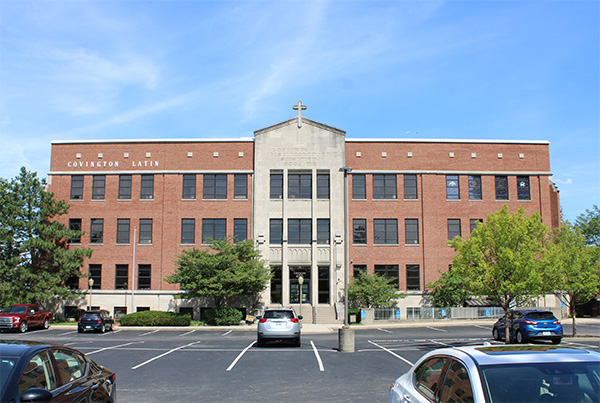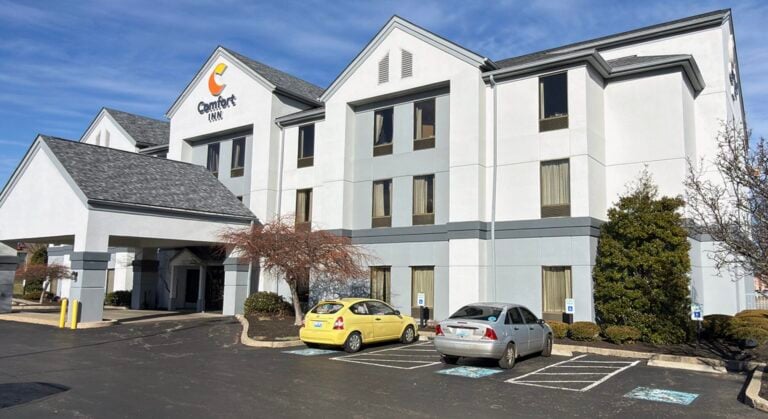We’re celebrating ten years of Our Rich History. You can browse and read any of the past columns, from the present all the way back to our start on May 6, 2015, at our newly updated database: nkytribune.com/our-rich-history

By Paul A. Tenkotte, PhD
Special to NKyTribune
In the 1940s, traffic along the Dixie Highway (U.S. Routes 25/42) crept through Covington, and southwest through the suburban communities of Park Hills, Lookout Heights (now Fort Wright), Fort Mitchell, Erlanger, Elsmere, Florence and beyond.

Before the construction of Interstates 71/75 throughout the same area in the 1960s, the Dixie Highway carried the heavy burden of north and southbound traffic, including commuters, travelers, and interstate truck drivers, from Michigan to Miami, Florida (there were actually western and eastern divisions of the Dixie Highway — for more information see Chris Mieman, “Dixie Highway,” in Paul A. Tenkotte and James C. Claypool, eds. “The Encyclopedia of Northern Kentucky.” Lexington, KY: University Press of Kentucky, 2009).
My mother grew up at 615 Pike Street in Covington, ironically long since demolished by the Kentucky Department of Transportation for a widening of the right-of-way for I-71/75. The quaintly-named Pike Street, a reference to the 1800s Covington and Lexington Turnpike — a precursor of the Dixie Highway — belied the gas fumes and congestion that often choked the Pike Street section of the highway within the city limits. My mother remembered stalled traffic and lots of accidents, especially along the treacherous “Big Bend” of the Dixie Highway that wound its way up the hill outside of the city limits and into Park Hills.

All along the Dixie Highway through Park Hills, businesses developed to serve the national travelers passing through. They included the White Horse Tavern, as well as other restaurants of the so-called “Gourmet Strip.”
One of those businesses was the Colonial Bake Shop at 1470 Dixie Highway in Park Hills. As a child in the 1960s, I have fond memories of stepping through its door, smelling the coffee and all kinds of delectable baked goods, from cakes to pies to Virginia reels, coffee cakes, and donuts.
In 1941 the Flavorite Donut Company, which had been located on Back Street in Cincinnati for “six or seven years,” broke ground for a new baking facility at 1470 Dixie Highway in Park Hills. D. Collins Lee, the principal developer of the suburb of Park Hills, constructed the structure, which he then leased to the baked goods company. The 50 by 120 foot, one-story brick building featured white brick and tile on the exterior, and gleaming tile on the interior. Flavorite was expected to employ 25 to 30 people (“New Industry to be Located on Dixie Here: Baking Concern to Occupy New Plant Now in Cincinnati,” “Kentucky Post,” September 5, 1941, p. 1).

However, not all Park Hills residents were happy about the announcement. In October 1941, 75 residents met to oppose the construction, fearing that it would turn the community into an industrial area and negatively affect their property values. Their efforts proved to no avail (“75 Attend Protest Meet in Park Hills,” “Kentucky Post,” October 23, 1941, p. 1).
Actually, the Flavorite Bake Shop proved to be a very good neighbor, emitting delightful smells that somewhat mitigated the automobile pollution that hung over the highway.
By 1950 Ray Thomas Edwards (1910–1981) assumed operations of the Flavorite Bakery. Known popularly as “Tommy Edwards,” he had served as former manager of the Devou Club House in Covington’s Devou Park and also had twenty years of experience at the Pure Food Bakery (advertisement, “Kentucky Post,” April 15, 1950, p. 2; “Edwards” obituary, “Cincinnati Enquirer,” December 18, 1981, p. 80; “Ray Thomas Edwards” family tree, ancestry.com).

Tommy Edwards’s Flavorite Bakery was open 24 hours daily to serve travelers. It featured a coffee shop that included breakfast and luncheon items, soups, sandwiches, and baked goods. Their 1950 advertisements in the “Kentucky Post” proudly noted that they were “air-conditioned,” “open 24 hours daily,” and baked “twice daily.” In addition, there was a small parking lot in the front and along the side (advertisement, “Kentucky Post,” June 30, 1950, p. 7).
Under Tommy Edwards’ direction, Flavorite began to offer some of its popular selections at area stores. By 1951 it listed seven locations where its products could be purchased, including its Dixie Highway outlet, as well as four downtown Covington locations—Hill’s Grocery and Seed on Pike Street, Pilger’s Candy at 910 Madison Avenue, the Covington City Market on Scott Street, and at 7th and Madison Avenues. In the Westside — now Mainstrasse — area of Covington, Finke’s Delicatessen sold Flavorite products at 824 Main Street. And in neighboring Campbell County, they were available for sale at 1039 S. Ft. Thomas Avnue in Fort Thomas (advertisement, “Kentucky Post,” April 27, 1951, p. 2).
In 1958 Sanford (Sonny) Acree acquired the Flavorite Bakery and renamed it the Colonial Bake Shop. Acree had a knack for marketing. In the 1950s he established a local “Perfect Loafers” club of the Young Bakers of America, encouraging the involvement of youth. Under his ownership, the Colonial Bake Shop sponsored “Little Miss Muffin” and pie-eating contests, as well as other fun events (“Local Bakers Plan for ’59 Convention,” “Kentucky Post,” December 23, 1958, p. 1; “ ‘Perfect Loafers,’ Make News,” “Kentucky Post,” January 12, 1961, p. 10; “Famous Bakery in Kentucky,” “Cincinnati Enquirer,” February 22, 1952, p. 52).
In February 1962, the “Cincinnati Enquirer” featured an article on Colonial Bake Shop, heralding its 25 “varieties of yeast and cake donuts.” An accompanying photo showed the bakery’s iconic—and gigantic—“donuts” sign that lured southbound travelers into its shop.

Sonny Acree’s marketing skills were astute. A resident of South Fort Mitchell, along with his wife and two children, Acree’s involvement in the baking profession contributed to his business’s success. He served as vice president and then president of the Greater Cincinnati Retail Bakers Association, as a director of the Kentucky Master Bread Bakers Association, and as president of the Young Bakers of America (“Famous Bakery in Kentucky,” “Cincinnati Enquirer,” February 22, 1952, p. 52; “ ‘Dixie Dandies’ at Colonial,” “Cincinnati Enquirer,” December 20, 1962, p. 63).
The Colonial Bake Shop continued in business throughout the early 1970s.
On July 16, 1978, Sanford “Sonny” Acree died at age 50. Subsequently, the location became an automobile repair shop and now a Glass America location (“Sanford ‘Sonny’ Acree” family tree, ancestry.com).
My memories of the Colonial Bake Shop remain vivid. One day before Christmas in the 1960s, I accompanied my mother to Colonial. My eyes lit up as I spotted a very tiny plastic nativity set, meant to be a cake decoration. As a child and even as an adult, I absolutely loved nativity sets.
My mother saw my enthusiasm and asked if I would like it. I couldn’t believe my luck. It even came in a small plastic compartmentalized box. I still cherish it to this day. Sometimes the smallest acts of love and kindness remain with us for years, positively shaping our lives and the adults that we become.

Paul A. Tenkotte, PhD is Editor of the “Our Rich History” weekly series and Professor of History at Northern Kentucky University (NKU). To browse ten years of past columns, see: nkytribune.com/our-rich-history. Tenkotte also serves as Director of the ORVILLE Project (Ohio River Valley Innovation Library and Learning Engagement). He can be contacted at tenkottep@nku.edu.
We’re seeking historic photos of Park Hills to help us document and celebrate the city’s one hundredth anniversary in 2027. Please contact Paul Tenkotte at tenkottep@nku.edu if you have photos or stories to share.
Featured photo: The White Horse Tavern, Park Hills, Kentucky, after the 1956 addition to the right. (Postcard image from the collection of Paul A. Tenkotte)

















